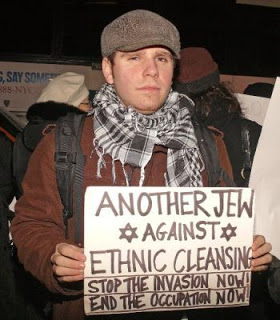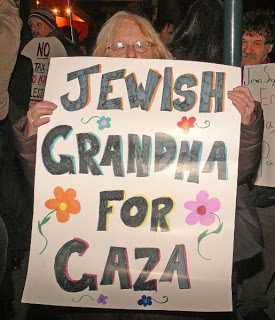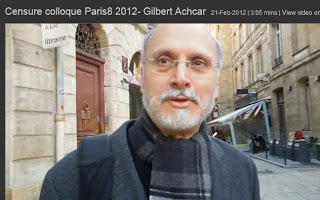A very interesting article which I sourced from Muzzlewatch on the attempts by Zionist ideologues to equate support for the Palestinians, opposition to Zionism and support for the holocaust of European Jews together. It relies heavily on Gilbert Achcar’s book ‘Arabs and the Holocaust’ which I reviewed critically on my own blog and before that in the Journal of Holy Land Studies (May 2011).
Annette Herskovits was herself a survivor of the Holocaust, hidden during the war. Both her parents died in Auschwitz, but she rejects the idea of a ‘Jewish State’ which mirrors the principles that led to the genocide of the Jews. As I showed in a recent article the late Israeli Prime Minister Yitzhak Shamir had been one of 3 leaders of the Stern Gang, a terrorist Zionist group that made an offer to collaborate militarily with the Nazis against the British. The hypocrisy of Zionism in accusing the Palestinians, themselves the victims of barbarous racism, of being Nazi-like is breathtaking.
There is, as readers will know, much on my site about the comparisons between the Nazis and Zionists, not least those sections of the Zionist establishment which openly proclaim that the Nazis got it right when it came to subjugating occupied peoples.
See also Beyond Ignorance and Prejudice: Five Films Portray Palestinan Lives By Annette Herskovits, Special to the Planet Thursday February 25, 2010 – 09:13:00 AM
Tony Greenstein
Countering the myths spread by pro-Israel ideologues
By Annette Herskovits
The intricate, sprawling architecture of deception that shapes understanding of the Israel-Palestine conflict in America is probably unique in history. For over six decades, the U.S. Congress, successive presidents, media, public opinion, all have supported a story which portrays Israel as wholly good and innocent, while painting those resisting its violence and injustice as anti-Semites, Nazis, and terrorists. The myth that Israel is the victim of unprovoked attacks by uncivilized Arabs persists, even in the face of Israel’s brutality and violations of international law in its 44-year long occupation of the Palestinian Territories.
The grip of this fiction on the American collective mind reflects a conjuncture of causes: the West’s guilt about the Holocaust; the proto-Zionist theology of American evangelical sects; U.S. imperial interests in Middle East oil reserves; and the West’s long-distrust of and contempt for Arabs and Muslims.
Propaganda produced by Israel and the American Jewish establishment inverts reality. This is crude stuff, manifestly false to anyone who would look up information published by a multitude of respected media and human rights organizations. But omissions and outright lies are probably a deliberate tactic: deny, deny … confuse, confuse … Like Israel’s building of “facts on the ground” (settlements, roads, etc.), it gains time; the hope is that Israeli power will eventually be so entrenched in the land of “Greater Israel” that nobody will remember Palestinians ever lived there.
The justice of the Palestinian cause is increasingly recognized in the West, particularly at the grassroots level. This is due, above all, to the courage and persistence of the Palestinians themselves. But scholars—Arab, Jewish, and other—who challenge the deceptive narratives also deserve credit. One such scholar is Gilbert Achcar, a Lebanese-born professor at the University of London and author of several books on the Middle East and U.S. foreign policy.
A smear campaign
The Arabs and the Holocaust: The Arab-Israeli War of Narratives (Henry Holt and Company, 2010), Achcar’s most recent book, is an ambitious attempt to present an accurate history of Arab attitudes toward Nazism, Jews, and the Holocaust. It refutes the story told by pro-Israel zealots, who attribute hostility to Israel in the Arab world not to Israel’s actions, but to Arabs’ hatred of Jews: hatred, they argue, which originated in Islam and flourished with the Arabs’ collaboration with the Nazis during WWII.
The book has been well received by Middle East and Jewish Studies scholars, and Achcar has been invited to give talks on many university campuses. This raised the ire of David Horowitz, founder of the Horowitz Freedom Center, which, according to its mission statement, “combats the efforts of the radical left and its Islamist allies to destroy American values and disarm this country … The leftist offensive is most obvious on our nation’s campuses, where the Freedom Center protects students from indoctrination and political harassment.”
Last November, an article in the web FrontPage Magazine, edited and published by Horowitz, launched a smear campaign against Achcar. Focusing on a presentation by Achcar under the auspices of Middle East Studies of the University of California at Berkeley, the article appeared on a host of kindred websites, such as that of Campus Watch, an organization founded by Daniel Pipes, a main purveyor with Horowitz of Islamophobic material and whitewashing of Israel.1
Another attack, directed at Achcar’s lecture in the Jewish Studies Department of the University of California at Davis, came from BlueTruth, a blog devoted to “refuting the accusations and exposing the lies that are being told … about Israel, Jews and pro-Israel organizations …” One such lie, to judge by the article, is that Israel was “built on Arab land.”
As someone whose mother and father were murdered in Auschwitz, and who herself survived the Nazis’ barbarous nationalism thanks to the courage of a group of Catholics, Protestants, Communists, and Jews, I find the idea that defending the “Jewish state” supersedes all other human obligations both immoral and senseless. Nothing, not even the Holocaust, justifies Israel’s treatment of Palestinians or the continuing efforts of pro-Israel zealots to show Arabs and Muslims as less than human. Israel and its unconditional supporters are on a path leading to catastrophe not only for Palestinians, but in the not very long run, for Israel itself.
The Arabs and the Holocaust
In his talk at Berkeley, Achcar described the book’s main purpose as deconstructing the image, dominant in the West and Israel, of Arabs as pro-Nazi. Relying on an extensive array of primary sources and historical studies, Achcar presents an “Arab world” with a great diversity of beliefs and opinions, a multiplicity of evolving ideological currents—just as in the West. The many Arab countries are not peopled by an indistinct mass of millions animated by ancestral hatred of the Jews. “The Arabs,” Achcar writes, do not exist “as a politically and intellectually uniform group.”2
The first part of Achcar’s book covers the period from 1933, when Hitler acceded to power, until Israel’s foundation in 1948. At that time, “liberal Westernizers” and Marxists took a strong stand against both Nazism and anti-Semitism. In the various Arab nationalist movements, sympathy for the Axis varied but was overall low, and opposition to Zionism did not translate into hatred of “the Jews.” It is only among “reactionary and/or fundamentalist pan-Islamists” that significant anti-Semitism and support for Nazism were found.
Several recent studies confirm this. For example, Achcar’s book quotes Israel Gershoni, a professor of Middle Eastern History at Tel Aviv University, who wrote that in the 1930s:
“the overwhelming majority of Egyptian voices—in the political arena, in intellectual circles, among the professional, educated, urban middle classes and even in the literate popular cultures—rejected fascism and Nazism both as an ideology and a practice, and as “an enemy of the enemy.” 3 [a reference to “The enemy of my enemy is my friend,” a view which did create some support for Nazi Germany among Arabs living under the yoke of French and British colonization.]
Those painting Arabs as heirs to Nazism use as “proof” one particular episode: the 1941 Baghdad “pogrom” (the Farhud). In April 1941, Iraqi pro-German nationalists led a coup against Iraq’s pro-British regent. Propaganda by the German legation, reinforced by the presence of the pro-Nazi Mufti of Jerusalem, had whipped up anti-Jewish feeling in Baghdad. British forces invaded Iraq, put the pro-German government to flight, and secured Baghdad, but their troops remained posted on the outskirts. Rumors circulated that the Jews were helping the much-hated British. There followed two days of killing and plunder; about 180 Jews were murdered. The rioters were stopped when Iraqi troops entered Baghdad and reestablished order, killing many of the mob.
Achcar notes that the vast majority of Muslim Iraqis condemned the violence and many protected their Jewish neighbors at the risk of their own lives. Looters from Baghdad’s slums, driven by need rather than anti-Jewish sentiment, joined in the action. With the regent back in power, the Iraqi government granted compensation to the families of Jewish victims.
Achcar’s account of the Farhud agrees with that of several authors, such as Nissim Rejwan, an Israeli writer of Baghdadi origin.4 There is little evidence that the Farhud was indicative of widespread and deeply rooted hatred toward Jews in the whole of “the Arab world.” Note that no anti-Jewish rioting occurred in any other Arab country during WWII, despite the calls to jihad broadcast from Berlin by the Mufti from November 1941 on.
In fact, Arabs played a truly remarkable role in defeating Hitler, a fact so carefully suppressed by the French after the war that I did not learn of it in 15 years of schooling in France. As part of De Gaulle’s Free French Forces, Arab troops from French North Africa contributed massively to the liberation of Europe. They fought alongside the Allies from the landing in Sicily in July 1943 to the invasion of Germany in 1945, with great loss of life. For instance, 233,000 of the 550,000 Free French troops landing on the Mediterranean coast in Nazi-occupied France in November 1944 were North African Muslims.5
The second part of Achcar’s book traces the rise of anti-Semitism in the Arab world after the founding of Israel in 1948. Western anti-Semitic themes, such as the “international Jewish conspiracy” of the fraudulent Protocols of the Elders of Zion, found their way into public discourse. Achcar does not excuse or minimize Arab anti-Semitism. He deplores the “abysmal stupidity” of these “anti-Semitic ravings or mindless denials of the Holocaust.” But do these ravings indicate an Arab wish to exterminate the Jews, a project they supposedly inherited from the Nazis? These claims are absurd, according to Achcar and many others. Nissim Rejwan, for instance, writes:
Neither their religious culture nor their historical record lends credence to the claim that the Muslim Arabs of today are capable of the kind of historical consummation that found expression in Auschwitz and other Nazi extermination camps … Viewed in anything like the correct historical perspective, the idea of “Arab Auschwitz” is an absurdity.6
And, of course, there are parallel ravings in Israeli/Jewish political discourse: referring to Arabs by animal names, calling for their expulsion and annihilation, and so on. See Israeli General Rafael Eitan’s infamous statement: “When we have settled the land, all the Arabs will be able to do about it will be to scurry around like drugged cockroaches in a bottle.”7
Achcar writes: “There are more anti-Semites among the Arabs today than among any other population group—for obvious historical reasons” [emphasis mine].8 These historical reasons, which are indeed obvious, were they not again and again obfuscated by pro-Israel apologists, include: Israel’s ethnic cleansing of 750,000 Palestinian Arabs in 1948-1949 and its systematic destruction of 418 Palestinian villages to prevent the refugees’ return: creating 300,000 more Palestinian refugees in 1967; a brutal and tyrannical occupation accompanied by continued ethnic cleansing ever since; and atrocities against civilian populations in wars in the West Bank, Gaza Strip, and Lebanon.
Contemporary Arab anti-Semitism is not unmotivated, atavistic hatred. It is rooted in anger at Israel’s very real aggressive and destructive policies. Even Bernard Lewis, a historian favored by defenders of Israel, wrote “for Christian anti-Semites, the Palestine problem is a pretext and an outlet for their hatred; for Muslim anti-Semites, it is the cause.” 9 Remove the cause—that is, end Israel’s ethnocentrism and expansionism—and Arab anti-Semitism would likely fade away.
Achcar shows how Arab anti-Semitism is “reactive” and changeable—dependent on Israel’s actions, its violence, its propaganda (e.g., calling Arabs “Nazis”), and on the particular historical and political circumstances of the various Arab/Muslim countries. It is not “the fantasy-based hatred of the Jews that was and still is typical of European racists.”10
I surmise that The Arabs and the Holocaust was written with an Arab audience in mind as well as a Western one. The book has been translated into Arabic and it is, among other things, an attempt to build bridges, a call for each side to listen to the other. He writes:
It is faith in human reason that justifies the hope that what counts as truth on one side of the Green Line or, rather, of the separation wall, will not forever count as error on the other.11
In the conclusion, describing “statist Zionism” as “a Janus, one face turned toward the Holocaust, the other toward the Nakba, one toward persecution endured, the other toward persecution inflicted,” Achcar returns to the need for each side to acknowledge the sufferings of the other:
Only recognition of both of Janus’ faces—of the Holocaust and the Nakba—can bring Israeli, Palestinians, and other Arabs in genuine dialogue.12
Achcar’s book displays a formidable knowledge of the currents of thought on both sides of the Arab/Jewish divide as well as a brilliant analytic mind. By placing Arab attitudes toward the Holocaust in historical and psychological contexts, he opens up vistas to Western readers beyond the shallow, warped views of U.S. main media. He understands and has compassion for the historical wounds of the Jews. His integrity and openness shine throughout.
Hasbara
The authors of the FrontPageMag article, Cinnamon Stillwell and Rima Greene, seem not to be concerned about historical context. They mix innuendo, distortion and falsehood, quote out of context and misquote, then add in one or another point of dogma. They do not at any point counter Achcar with contrary evidence. Instead, they speak in generalities, e.g., Achcar’s book “masks its outlandish conclusions with scholarly apparatus while confirming the biases of the left-leaning, anti-Israel Middle East studies establishment.”
The “Hasbara Handbook: Promoting Israel on Campus” (hasbara is Hebrew for “public relations, “ or “propaganda”), published in 2002 by the World Union of Jewish Students, gives advice on how to score points “whilst avoiding genuine discussion”: rather than addressing your opponent’s arguments, make “as many comments that are positive about Israel as possible whilst attacking certain Palestinian positions, and attempting to cultivate a dignified appearance”; repeat points again and again, “If people hear something often enough, they come to believe it.” The same tactics seem to be used in the writing of most FrontPageMag articles.
Nakba vs. Holocaust
Stillwell and Greene write: “Achcar concluded by drawing an asinine correlation between the Holocaust … and the ‘Nakba’ or ‘catastrophe,’ the Arabic term to describe the creation of the state of Israel: ‘The Shoah ended in 1945, but the suffering of the Palestinians is never-ending.’”
In fact, Achcar, in his talk characterized the Nakba as “fortunately not a genocide, but what we could call an act of ethnic cleansing.” He went on to say that real dialogue conducive to peace requires the mutual recognition of the tragedies of each other without putting them on the same plane … because the magnitude of the Holocaust cannot be compared to that of the Nakba… Nevertheless, this does not diminish the importance of what Palestinians have suffered. Not only the ordeal of the Palestinians is continuing … But they went through … the worst kind of experience just recently in Gaza in the winter of 2008-2009.
In his book, Achcar condemns making “no distinction between colonialist usurpation of a territory and the racist extermination of a whole population.”13 He quotes Edward Said: “Who would want morally to equate mass extermination with mass dispossession?”14 But he also states that Palestinian suffering is ongoing, and getting worse.
In fact, it is rarely useful to compare the Holocaust and the ordeal of the Palestinians; it does not help us understand the reality of either. Sixty-four years have elapsed since the Nakba, 64 years during which Palestinians have been subjected to further wars, expulsions, and dispossession. They have been denied political, economic, and human rights. At present, in Gaza, 1.5 million people, half of them children, are imprisoned behind a 25-foot high fence and regularly attacked by Israeli drones and Apache helicopters, killed by fire from tanks and snipers on Gaza’s borders; in the West Bank, Palestinians are evicted from their land to make way for Israeli settlers who harass and kill with impunity; and East Jerusalem is being “judaized,” i.e., emptied of its Palestinian inhabitants.
This is not genocide, but what name is there for it?
Anti-Arab racism in Israel
Stillwell and Greene claim that, unlike anti-Semitism in the Arab world, “’anti-Arab attitudes in Israel’ are neither widespread, [nor] promulgated through state-provided education and other official means.” But all polls of Israeli Jews reveal deep anti-Arab feeling. For instance, the Israel Democracy Institute released a poll in January 2011, which found that nearly half of Israeli Jews would not want to live next door to an Arab.15 Racism is strongest among the young: the Yedioth Ahronoth newspaper reported that civics teachers around the country were complaining of rampant, virulent anti-Arab racism amongst their Jewish students.16
Nuri Peled-Elhanan, an Israeli professor of education and author of a book on Israeli school books,17 thinks “state-provided education” is a main culprit in promoting racism. Interviewed in the Guardian, she said Israeli school books describe Arabs “as vile and deviant and criminal, people who don’t pay taxes, people who live off the state, people who don’t want to develop… The only representation is as refugees, primitive farmers and terrorists.”
She added: “One question that bothers many people is how do you explain the cruel behavior of Israeli soldiers towards Palestinians, an indifference to human suffering, the inflicting of suffering. … I think the major reason for that is education.”
“Other official means” of promulgating racism include laws that are the very foundation of the Israeli state: the 1950 Law of Return and 1952 Citizenship Law, which allow every Jew in the world to immigrate to Israel and become an Israeli citizen. These same laws forbid the return of Palestinians who were forced to flee their homes from 1947 to 1952. This inequity may have made sense to those in the West who lived through the years after WWII, when the horrors of the Holocaust and general acceptance of colonialism blinded almost everyone to the injustice perpetrated against Palestinian Arabs. But it is much past time to look at the situation through Palestinian eyes.
More recent laws show racism becoming increasingly institutionalized in Israel. Adalah, the Legal Center for Arab Minority Rights in Israel, reports that “the current government coalition has proposed a flood of new racist and discriminatory bills.” One such bill legalizes “admission committees” operating in nearly 700 small towns, allowing them to reject applicants deemed “unsuitable to the social life of the community … or the social and cultural fabric of the town”—for “unsuitable applicants,” read principally “Arabs.”18
Holocaust denial, Nakba denial
Israel’s recent Nakba Law effectively forbids the public commemoration of the Nakba. Israel lodged a protest when UN secretary-general Ban Ki-Moon used the word in a telephone conversation with Mahmoud Abbas on May 2008, the 60th anniversary of the Nakba. Tzipi Livni, then Israel’s foreign minister, declared: “The Palestinians can celebrate an Independence Day if, on that day, they eliminate the word Nakba from their vocabulary.”
Speaking with her usual icy self-assurance, Livni was essentially telling the Arab minority to shut up about a fact no historian denies, not even Zionist historian Benny Morris, who said: “I don’t think that the expulsions of 1948 were war crimes. You can’t make an omelet without breaking eggs.”19 Because she speaks as a government minister of a state with a very powerful military and several hundred nuclear weapons, her pronouncements are alarming.
Livni makes luminously clear that Israel is not a democracy for all its citizens. For the Jews, yes, although the rights of dissenters are increasingly restricted. In effect, “a Jewish and democratic state” is an oxymoron, no matter how much ink has been spent to deny it: a state so defined must privilege the Jews over other citizens. And being Jewish is unlike being, for example, French. One can become French by participating in the country’s communal life for five years, but there is no way to become Jewish and qualify for the Law of Return except by converting to Judaism, or by being “a child and a grandchild of a Jew, the spouse of a Jew, the spouse of a child of a Jew, and the spouse of a grandchild of a Jew.”
Israel: innocent, victimized, maligned …
Gail Rubin J.D. author of the BlueTruth article, waxes indignant at Achcar for describing Israel as a “’settler colonial project’ built on ‘Arab land,’” and “accusing Zionists of ‘ethnic cleansing of the Palestinians.’”
That Israel was built on Arab land, whether bought or confiscated, is undeniable. As for “ethnic cleansing,” Benny Morris, who argued in his early books that the Palestinians had fled because of the war, now concedes the role of deliberate Zionist policy: “I have concluded that pre-1948 thinking had a greater effect on what happened in 1948 than I had allowed for…”20
In any case, no one denies that Israel prevented the return of refugees, a violation of international law. It was Israeli policy to shoot as “infiltrators” Palestinians trying to return to their villages in the night. Hundreds of villages were destroyed to foreclose their former inhabitants’ return.
Arguments about the colonial nature of the Israeli state usually take the form of semantic nitpicking. Sociologist Maxime Rodinson, a French Jew who first broke the taboo against calling Israel a “colonial-settler state,” concludes his remarkable 1967 essay:
… the creation of the State of Israel on Palestinian soil is the culmination of a process that fits perfectly into the European-American movement of expansion in the nineteenth and twentieth centuries whose aim was to settle new inhabitants among other people or to dominate them economically and politically. This is, moreover, an obvious diagnosis, and if I have taken so many words to state it, it is only because of the desperate efforts that have been made to conceal it.21
Stillwell and Greene recommend a review of Achcar’s book by “atypical professors” Matthias Küntzel and Colin Meade. The lengthy review 22 takes up the themes of Küntzel’s book, Jihad and Jew-hatred: Islamism, Nazism and the roots of 9/11, such as: Islamist movements—al-Qaeda, Hamas, Hezbollah, Iran’s regime—originated in the lethal link between Islamism and Nazism; the Arabs have inherited “eliminatory anti-Semitism” from the Nazis; jihadism and jihadist anti-Semitism are the greatest threats to the world today. According to Achcar, his book is “a fantasy-based narrative pasted together out of secondary sources and third-hand reports.”23
In Küntzler’s view, responsibility for the Palestine-Israel conflict lies entirely with the Palestinians and Arabs:
… it is not the escalation of the Middle East conflict that has given rise to anti-Semitism; it is rather anti-Semitism that has given rise to the escalation of the Middle East conflict – again and again…. In fact, what we are seeing is the revival of Nazi ideology in a new garb.24
This is yet another version of the myth that Israel acts only in response to Arab aggression. In fact, following the conquest of land and expulsion of its native Arab inhabitants, Israel again and again inflicted great harm on Arabs and Muslims—primarily the Palestinians, but also those living in the border states—through actions that cannot be attributed to Israel’s need to survive. Consider the annexation of Jerusalem, a city sacred to Islam; the occupation of the Palestinian territories and of the Golan Heights; and wars such as that against Lebanon in 2006, supposedly a response to the kidnapping of two Israeli soldiers that resulted in 1,200 Lebanese deaths, almost all of them civilians.
One example provides strong evidence that Arabs have not inherited the Nazis’ exterminatory will. The 2002 Arab Peace Initiative, re-endorsed unanimously by the Arab League in 2007,25 calls upon Israel to withdraw from all the territories occupied since 1967, and for the establishment of a Palestinian state on the West Bank and Gaza Strip, with East Jerusalem as its capital. The Arab countries would then commit to establishing normal relations with Israel and provide security for all the states of the region. Israel is entreated to accept the initiative to “[enable] the Arab countries and Israel to live in peace and good neighborliness and provide future generations with security, stability and prosperity.” The initiative calls for “a just solution to the Palestinian refugee problem,” but expresses support for any negotiated settlement between Israel and Palestinians.
It is difficult to find exterminatory anti-Semitism in all this. Unsurprisingly, Israeli politicians have ignored the initiative.
All signs point to the fact that Israel has never wanted an equitable peace settlement. Israeli governments since Israel’s beginnings, including Labor governments, have all acted to further the goal of a Greater Israel empty of Palestinians.
The how and why of pro-Israel watchdogs on campuses
Pro-Israel propaganda outlets like Frontpage Magazine carry little weight with scholars of the Middle East, but they are significant actors in sustaining the upside-down view of the Israel-Palestine conflict in America. They use intimidation to inhibit free speech on campuses, and poison the well of public discourse.
They advise students to take notes and report on professors, which especially intimidates junior, untenured faculty. They post on their websites telephone numbers and e-mail addresses of departments and faculties which get harassed by angry phone calls and swamped by hate mail.
Pipes and Horowitz encourage confrontation and creating disturbances, followed by complaints that their freedom of speech was curtailed. So here is Gail Rubin’s account of the Q&A part of Achcar’s talk at UC, Davis:
… challenging questions were not welcomed during the Q & A. I was abruptly censored while attempting to establish facts to challenge Mr. Achcar’s skewed conclusion that the Grand Mufti’s anti-Semitism had only a minimal impact on both Jews and Arabs. Professors Miller and Biale angrily told me the questions were insulting and to either stop or leave the room.
In fact, according to Jewish Studies Director, Professor Diane Wolf, Rubin was called on to ask her question, read a prepared script with no relation to Achcar’s talk, and then asked him whether he wasn’t blaming the Holocaust on the Jews. As he started to express that he was shocked and offended, she tried to re-read her statement. At this point, Professor David Biale and others told her to be quiet and Professor Susan Miller explained that in an academic environment, we wait for the speaker’s response to a question. She should leave if she could not abide by those rules. So the questioner was stopped only when she interrupted Achcar to repeat her statement.
In an interview after Achcar’s program, Professor Emily Gottreich, Vice Chair of the Center for Middle Eastern Studies at Berkeley, commented that if these campus pro-Israel activists were truly interested in engaging in academic dialogue, they would express their disagreements directly to the scholar in a public forum or to departmental chairs or program directors; instead, they appeal directly to donors, who tend to be neither Middle East experts nor particularly well-versed in the rules of academic discourse, to withdraw funding; or they approach university presidents or chancellors with accusations of anti-Semitism and “biased” scholarship.
Campus Watch and Horowitz’ Freedom Center are only two pieces in a large network of pro-Israel pressure groups operating on campuses. The Israel on Campus Coalition includes no less than 33 independent organizations, including the American Israel Public Affairs Committee (AIPAC) and Anti-Defamation League (but not Horowitz’ or Pipes’ organizations, whose work may not quite fit the coalition’s image). The coalition works “to engage leaders at colleges and universities around issues affecting Israel, and to create positive campus change for Israel.”
Why this vast deployment of resources on campuses? The answer is straightforward. A recent document by the David Project, dedicated to ensuring that “effective support for Israel thrives on campuses and in our communities,” states: “AIPAC has had a successful track record in building campus ties to future members of Congress and campus leaders.”26 To-morrow’s leaders are on campuses today, so the thinking goes, and they must be reached by Israeli propaganda as early as possible.
Changing Americans’ view of who Palestinians are
Philip Weiss, founder and co-editor of Mondoweiss.net, a website of news about Israel/Palestine, recounts a Skype-mediated “meeting” with youth in Gaza: “Most of the questions were from young men. They were smart but slightly abstract questions … Then Rawan Yaghi sat at the microphone and asked, What can be done to change Americans’ view of who Palestinians are?”
Weiss writes of being overcome with emotion by this “poised young woman wearing wire-rimmed glasses, 18 years old … There was such delicacy to her manner and her question … I struggled against upwelling emotions to answer her question. ‘`This is the biggest question of all, and I don’t know the answer.’”
For all of us living outside the prison of Gaza, this young woman’s question should come as a call to remember the immense harm created by prejudice, ignorance, and demonization. Voices like Gilbert Achcar’s must be heard on campuses and in larger public arenas.
Annette Herskovits, a holocaust survivor and the daughter of holocaust victims, holds a PhD in linguistics from Stanford University and is the author of Language and Spatial Cognition (Cambridge University Press, 1987, 2009). She has written a couple of dozen published articles on Palestine/Israel and is a Palestinian rights activist. Read other articles by Annette.
Annette Herskovits, a holocaust survivor and the daughter of holocaust victims, holds a PhD in linguistics from Stanford University and is the author of Language and Spatial Cognition (Cambridge University Press, 1987, 2009). She has written a couple of dozens published articles on Palestine/Israel and is a Palestinian rights activist.
1. Fear, Inc.: The Roots of the Islamophobia Network in America, Center for American Progress, August 2011. [?]
2. Achcar, The Arabs and the Holocaust, p. 33. [?]
3. Israel Gershoni, “Beyond Anti-Semitism: Egyptian Responses to German Nazism and Italian Fascism in the 1930s” (EUI Working Paper no. RSC 20001/32, San Domenico, 2001, p.6. [?]
4. Nissim Rejwan, The Jews of Iraq: 3000 years of history and culture. London: Weidenfeld and Nicolson, 1985. [?]
5. Benjamin Stora, L’armée d’Afrique: Les oubliés de la Libération, ?Volume 692 of Textes et documents pour la classe TDC. ?C.N.D.P., 1995. [?]
6. Nissim Rejwan, Arabs aims and Israeli attitudes. The Leonard Davis Institute, Davis Occasional Papers, No 77, 2000. [?]
7. “Israel Washes Away the Sins of Former Army Chief of Staff,” Washington Report on Middle East Affairs, January/February 2005. [?]
8. Achcar, The Arabs and the Holocaust, p. 274. [?]
9. Bernard Lewis, Semites and Anti-Semites: An Inquiry into Conflict and Prejudice. Reissued with new afterword. New York: W. W. Norton, 1999. p. 259. [?]
10. Achcar, p. 275. [?]
11. Achcar, p. 273. [?]
12. Achcar, p. 291. [?]
13. Achcar, p. 130. [?]
14. Achcar, The Arabs and the Holocaust, p. 26. [?]
15. “Israeli intolerance shows up on Internet, in Knesset, on the street,” Los Angeles Times, January 23, 2011. [?]
16. Tomer Velmer, “Student’s answer on civics test: Death to Arabs,” YNet Magazine, January 19, 2011. [?]
17. Nurit Elhanan-Peled, Palestine in Israeli School Books: Ideology and Propaganda in Education. Library of Modern Middle East Studies, 2012. [?]
18. “The Inequality Report,” Adalah, March 2011. See also “New Discriminatory Laws and Bills in Israel,” June 2011. Both can be downloaded from Adalah. [?]
19. “Survival of the Fittest? An Interview with Benny Morris,” with ?Ari Shavit, Logos 3.1, Winter 2004. [?]
20. Birth of the Palestinian Refugee Problem Revisited, p. 5. [?]
21. Maxime Rodinson, Israel: A Colonial-Settler State?, New York: Monad Press, 1973. [?]
22. “In the Straightjacket of Anti-Zionism,” on the website of Engage, “a resource that aims to help people counter the boycott Israel campaign.” Küntzel’s book Jihad and Jew-hatred, translated by Colin Mead, was published by Telos Press Publishing (2008). [?]
23. Achcar, p. 169-170. [?]
24. From a talk given at Yale University, “Hitler’s Legacy: Islamic Antisemitism in the Middle East.” [?]
25. Arab Peace Initiative. [?]
26. “A Burning Campus? Rethinking Israel Advocacy at America’s Universities and Colleges,” 2012. [?]





